Category: Blog
New Heathen Questions: Did I receive a sign?
I think the most frequently asked question that comes along in almost every Heathen forum is to “did I receive a sign from (fill in the blank?)” It’s the question that is the most difficult to answer. While historically, almost every religion has some sort of belief in signs from the other, it is very hard for a stranger to interpret if something is a sign and what that sign means.

Even in Christian culture, signs are often interpreted by those who receive it. Growing up, a local woman believed she had received a sign from God after the death of her husband when a cross appeared when her window cracked. She interpreted it as a sign her husband had gone to Heaven, and this was the interpretation that was accepted as truth in the community.
Heathenry tends to be more conservative than the evangelical community I grew up in when it comes to signs and messages from the other, and for good reason. In my experience, signs from the gods can become a contest when you get a group of modern pagans together. Spiritual competitiveness is a remnant of evangelical culture, where people want to see who can be the most emotionally moved by the spirit.
But that doesn’t answer the question – did you receive a sign from the gods? The only way I can answer this question is with a series of questions so that the person who thinks they might have received some sort of sign or portended from the divine can critically examine the experience and decide for themselves. I call it the MICE test.
Is the possible sign:
Meaningful? Is it about something that matters?
Interpretable? Do I have some idea of what this means?
Congruent with what I know about the being in question?
Extraordinary? Is this something that is outside of the mundane and every day?
This isn’t by any means a foolproof test, but it is a good place to start when it comes to making a critical examination of an experience. If you are still confused, concerned, or otherwise feel unsettled, talk it over with a trusted friend. I would advise you not to share it with anyone you don’t know well, because I find it lessens the impact if it really is some sort of divine experience.
At the end of the day, the only person who can decide if something is a communication from the divine is exactly that, because the message, if it is a message, is meant for you and not the populace as a whole.
On Reputation and Repair
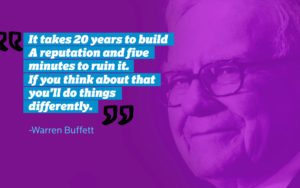 The word reputation gets tossed about quite frequently in Heathen circles, and for good reason. As a prestige culture, reputation matters more than it does to your average American. A person’s reputation, or lack thereof, is going to influence your ability to move in Heathen circles, and how you will be received. It’s one of the most basic currencies we have.
The word reputation gets tossed about quite frequently in Heathen circles, and for good reason. As a prestige culture, reputation matters more than it does to your average American. A person’s reputation, or lack thereof, is going to influence your ability to move in Heathen circles, and how you will be received. It’s one of the most basic currencies we have.
What is reputation? The simplest definition is how others perceive you. The key in reputation is the opinion of others that comes from your perceived thoughts, beliefs, and actions. Your reputation may not reflect your actual beliefs, thoughts, or intentions behind your actions. It is based solely on how others see you and your life. Actions are the foundation of reputation. Thoughts and values are not often something you express on a constant and widespread basis, so what you do forms most of the opinion others have of you. Let’s use Vince the Viking as an example.
Vince loves to go to his local pubmoot, but he is always twenty to thirty minutes late. You can almost set your watch by it. Ingrid gets frustrated because Vince is never on time. She starts telling Vince that the event is starting 30 minutes earlier than the actual start time. She also won’t allow Vince to host the event when she goes on vacation, because she is afraid he won’t be there.
There is a very logical excuse for Vince being late. His wife gets off work half an hour before the event, and because their second car has broken down, Vince must take his wife home before he can come. However, Vince has never expressed to anyone at the event that he is late due to transportation issues. If Ingrid had known, she would have offered to start the event 30 minutes later or offered to pick Vince up so he can let his wife use the car, but since Vince never communicated the issue, his reputation is bad when it comes to punctuality.
Reputation can be built even if you never actually interact with someone. What you post online on social media is a huge source of reputation. Businesses are now checking potential employee’s social media before hiring them. My husband is a cantankerous person online. However, face to face, he would never have the same arguments he does on Facebook. However, to someone who has never met him and shared a meal or a game, he’s a jerk if you look only at his interactions on Facebook.
The final source of reputation I am going to address is who you know. If I know you are friends with someone I respect, that speaks to your reputation. My kindred brother is a big-name Heathen author. I can often get into spaces that might not be accessible to me based on his reputation. It opens doors for interviews and other opportunities to network that my name alone never could.
Reputation matters, and it matters even more in the Heathen community. The Havamal speaks that the only thing that matters after one dies is their reputation.
At home shall a man be merry
And cheerful to his guests,
Cautious about himself,
Of good memory and ready speech,
If he wants to be very wise;
A good man is often talked of;
A great fool is he called
Who little can tell;
That is the mark of a fool.
~ Havamal
Geirrid settled in Borgardal, inside Alpta fjord. She caused her house to be built across the high road so that all were obliged to ride through it. A table set with food, which was given to every one who wanted it, always stood ready. Owing to this she was looked on as a high-minded woman.
~ Eyrbrygga Saga
What kind of reputation should we be cultivating? Just from the above quotes, we can glean a few characteristics that make up what would have been a good person to the Arch Heathens. Those include hospitable, intelligent, cautious, wise, and generous. These are all traits that I strive to embody in my life. I often fall short, but reputation is rarely static. It can be changed through a concerted effort.
Making the change sounds simple on the surface, but is difficult because it involves making significant changes to behavior over time. There are three basic steps. The first is to make a significant change in your behavior. The second is to demonstrate that change to people who matter, and the final is recognizing building or changing reputation takes time. Changing behaviors and beliefs is a difficult process. I have found that I needed outside, professional help to change some of my behaviors.
I want my reputation legacy to be of someone who is generous, wise, and intelligent. What do you want your legacy to be?
The Heathen (Fake) News Cycle
The ignorant booby had best be silent
When he moves among other men,
No one will know what a nit-wit he is
Until he begins to talk;
No one knows less what a nit-wit he is
Than the man who talks too much.~ Havamal
Recently, a Heathen website posted an article stating that the Asatru Folk Assembly is under investigation by Naval Criminal Investigative Service (NCIS) as being a hate group. This report spread like wildfire across the Heathen internet. This lead to other rumors circulating, including that AFA members were banned from certain events, AFA members would be kicked out of the military, and that AFA chaplains would lose access to military bases. The constant churning of social media took what was already just hearsay and turned it into a certain and finite event.
I am ashamed to admit I bought in to this rumor, after hearing it from a trusted friend. However, as of this writing, there is not a single other source for this information other than the original website. There has not been a publication by the US Military, and the AFA has not come out on their official site or their Facebook and issued any public statement. Major Pagan news outlets like The Wild Hunt have had zero coverage.
This story has taken on a life of its own beyond the initial website because true or not, it touches a nerve. It places both sides in a position where this post appeals to feelings. For those who dislike the AFA, they feel vindicated that a group they see as hateful is losing power. For those who support the AFA, this is proof of their belief that society is too “politically correct” and they are being persecuted for their beliefs.
In modern society, we all often struggle to differentiate “fake news” from reality. There is a great deal of pressure from content providers to make money. Most of this income is from what are called “impressions” or how many times an advertisement is seen. Most companies pay in what is known as PPM or per 1000 impressions. The more eyes that are on your website, the more money you make.
When there is a need to create fresh content to drive those views, journalism can fall by the wayside. Rumor is all many websites need to take a piece of information and turn it into an article. Even the largest mainstream news organizations frequently turn stories so fast that they make mistakes that would not otherwise be made if they had taken the time to confirm the information. Rarely is breaking news, especially in a small niche market such as Heathen news, so urgent it cannot wait until more conclusive facts have emerged.
Stories about the AFA are a hot ticket, and they generate traffic from both those who strongly disagree and agree with their political beliefs. I personally find the AFA and their positions abhorrent. I also believe that I should be building a reputation not as a gossip and that truth is the greatest weapon that one can wield in the face of bigotry.
So how do we spot fake news? This infographic from Factcheck.org is helpful in explaining how to tell truth from fiction.
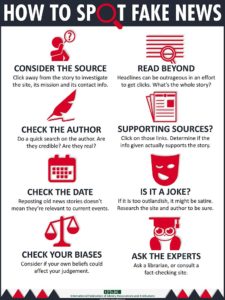
As a reputation based religion, we need to make sure the information we pass on is correct, so we do not damage others reputations (and our own) with rumors and falsehoods. This means getting all the facts before we move forward.
The Marginalization of Polytheism
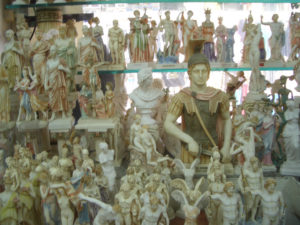 Marc over at of Axe and Plough wrote an amazing piece on how modern western polytheists (what some refer to as hard polytheists) are marginalized not just in theology or society, but also by other pagans.
Marc over at of Axe and Plough wrote an amazing piece on how modern western polytheists (what some refer to as hard polytheists) are marginalized not just in theology or society, but also by other pagans.
My gods aren’t personal… and that’s okay.
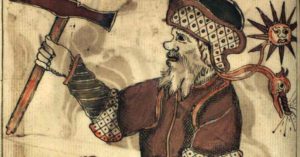
Thor (18th Century Iceland)
Recently Real Heathenry published a piece arguing for the postion of the Gods not being personal Gods. I agree with them. Whether you agree or not, I strongly urge you to go read their piece, even if you disagree. I have found that the more I challenge my own beliefs, the more I learn and grow as a person and a Heathen.
I am not going rehash their points. I want to talk about something that goes beyond that question, into my own personal practices and beliefs. This essay is my own personal experience as a Heathen woman over the past fifteen years. It is not a criticism of anyone’s beliefs and practices. I only speak to what I believe is the best practices for me, and how I came to those conclusions.
I grew up in a religious tradition that heavily valued a personal relationship with their god. It was the focus of one’s life, and the focus of almost all aspects of worship and study. There is something deeply meaningful about the idea there is someone up above looking out for you. This belief is very pervasive in almost all modern western religion.
When I first became a Heathen, the idea of being “fultrui” with a god was common, if not expected. For many years, I considered myself a devotee of Frey. However, I never got back the relationship that I expected. I believed that all gods worked the same way. I feel silly typing that out. The fact is every goddess or god in every pantheon is a unique being with unique personalities, likes, dislikes, and quirks. If one god in one belief system acted one way, that every god in every belief system acted the same was a giant logical fallacy on my part.
As time went on, however, I still craved some sort of personal relationship with something greater than myself. I wanted to feel a protective and loving power in my life, one that many people would associate with a divine presence. This was a time of great emotional and spiritual struggle for me. I even considered finding another religious path, my desire ran so deep. I tried on a few for size, but they never compared to the soundness I feel in my beliefs as a Heathen.
This lead to a moment of “Now what?” I firmly believe that daily connection to something greater than myself is critical to my spiritual and mental health. If the Gods are not the beings to fill that role, who is? Who can I petition for the daily needs of myself and my family? Who is invested in me and mine in
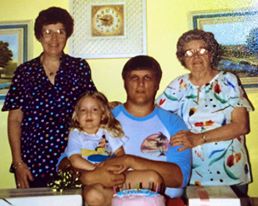
The author, her father, and her grandmother and great grandmother
a way that allows a strong personal relationship?
I was reminded who in my life has loved me unconditionally and has been there no matter what circumstances – my grandmother and great grandmother. There was no one I loved or trusted more than my grandmother and her mother. I am truly their heir. When they were alive, they both would have moved the heavens and earth to help me if I were in need.
I lost my grandmother almost two years ago, and her mother when I was a teenager. Both losses were very hard on me, because I felt as if a piece of my life was missing. However, as a Heathen, death is not the separation it is in other religions. We believe in actively maintaining our relationships with our ancestors, and they are with us. My grandmother and great-grandmother still have a vested interest in me, and as disir, they have knowledge beyond my moral human perceptions.
It started small. I wanted to build my relationship with them, since it had been a while since we talked. I set up an ancestral altar, and left gifts for them – their favorite foods, flowers, and other things I knew they loved. I visited every morning. I also began focusing on things that I knew that they enjoyed when they were living, specifically fiber work, music, and genealogy. The first two were incredibly important to this process, as my grandmother and great-grandmother taught me both.
Most of my family is buried far away, so I have made do with this altar. I go there now when I need guidance or just need to talk to them. Our relationship is just as strong as when they were alive. I get emotional writing this, because their love and presence in my life daily grounds me and helps me to remain focused on what is important. This relationship has also helped me internalize many Heathen concepts, and learn to be a more understanding and loving wife, daughter, friend, and sister.

The author and her grandmother
This has broadened over time to more of my female ancestors. I collectively call them “Amma,” the Icelandic word for Grandmother. I call to them many times through my day, sometimes in need of guidance, but mostly in gratitude for my life. I go nightly to my altar and leave gifts for them in gratitude for another prosperous day.
Through this process, I have discovered that I don’t need a “personal god.” I am fortunate and blessed to have powerful ancestors who I share deep and meaningful relationships. I live a life full of luck and prosperity. I credit all of this directly to my relationship with my Amma.
To any women who might feel a bit lost in Heathenry, I encourage you to forge these bonds with your disir. I cannot speak to men’s experiences, but I know that my disir were there and eager to be a part of my life and continue to build the familial luck and prosperity. I firmly believe that your disir are eager to be a part of your life as well.
Frith Part 1: The Historical
What ties you to your family and those you consider the closest to you? It’s many things, but can often be summed up as the shared experiences, emotions, obligations, beliefs, interests, goals, and traditions of a community or family. My brother and I are very close in part because of the shared experiences, emotions, and traditions we experienced growing up together. Those beliefs put into action obligations and goals between us. We are also bound by a blood relationship, and both believe in the importance of family, even if we believe differently about religion. I would do everything I could to help my brother, and he would do the same. I rejoice in his triumphs and share his sorrow.
I can share a similar story of my kindred brother, Ben. I have known him for almost 15 years. We have a strong history together. We share similar beliefs and goals in life because of the oaths we both made to our kindred. We have shared many experiences, and are invested in each other’s lives. His son is my godson, and his wife is my beloved friend. Much like my brother, I would do everything in my power to help Ben and his family, and I know he would do the same.
The descriptions above are frith in a nutshell. Frith is the joys, responsibilities, interdependence, burdens, and benefits of relationships bound by blood and oath. In modern society, these connections can be found in our blood familial relationships, kindreds, marriages, and adoption.
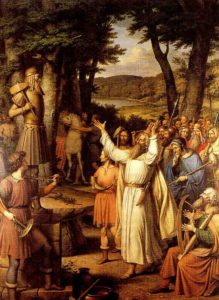
The Offering by J.L. Lund
The Historical Frith
The oneness of the kindred was no mere conceptual ideal; it was implemented and practiced as a matter of course in everyday life, and the name for this many-faceted thew was frith. (Grönbech)]
[F]rith is a dynamic established and maintained by the bonds of oath and kinship, in which potential strife is channeled constructively and mutual respect is maintained. (Gundarsson)
When we speak of historical Frith, the first source almost always quoted is The Culture of the Teutons. First published in 1901 by Vilhelm Grönbech, a professor of the history of religion at the University of Copenhagen, and then updated and translated by William Worster in 1931. His definition of Frith seems to be the most widely accepted by modern Heathens.
“Frith is something active, not merely leading kinsmen to spare each other, but forcing them to support one another’s cause, help and stand sponsor for one another, trust one another… The responsibility is absolute, because kinsmen are literally the doers of one another’s deeds.” (Grönbech)
Frith goes beyond emotion, into action between those who are bound together. Without action, frith is meaningless. I can say that I love my brother, that I would do anything for him, but if I fall short on those actions, there is no Frith between us. There might be love, a familial bond, but there is no Frith.
In ancient society, there were two types of frith, Kin-Frith and Oath-Frith. The first was the bond between families, and the second was the bond between a lord and his people.
Kin-Frith
Kin-frith was the bond that held the tribe together, and it was also a source of strife between tribes. In Winifred Hodge’s essay for the Frithweavers Guild, she states:
This absolute, uncompromising character of kindred-oriented frith actually contributed significantly to the pursuit of feuds and strife within the larger community, at the same time that it reduced strife within the kindred, inside the pale of frith. Frith was nothing if not partisan: focused on security and stability of the kindred, it had no application to those individuals and groups who lay outside the boundaries when it came to a conflict of interest between the two. Nor could any notion of absolute, unbiased justice make a dent in it: defending one’s kindred was always right, no matter how wrong their actions were. Frith was the paramount thew, taking precedence over all others. (Hodge) Emphasis Mine
Frith was absolute. It meant backing your kin, even if they were completely wrong. So great was this love and devotion, that you must side with them at all costs. Their actions were yours and your actions were theirs. There was a oneness of belief and purpose in a family, and it came before all else.
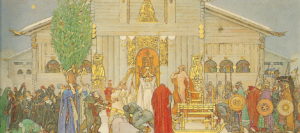
Midvinterblot, fourth sketch (1915) by Carl Larsson
Oath-Frith
Oath-frith (also known as king-frith) was a bond between a leader and his people. These bonds were incredibly important. The leader needed his people and the people needed their leader. In short, “the lord owed the man his livelihood, while the man owed the lord his life.” (Hodge) This was just not a one way relationships. Michael Cherniss speaks of the deep emotion that a leader had for his people
The devotion of the lord to his followers, and the love of the followers for their lord, are at least partially the result of the role which the lord plays as protector of the people. The lord’s first duty towards the comitatus is to protect his followers from whatever harm might befall them were he not present. (Cherniss)
Those oathed to a leader were expected to not just defend their lord but also to avenge him should he fall. Their deeds and actions were his, and added to his glory and reputation. They fought for him so that he would have victory.
In fact, the epic poem The Battle of Maldon, men swore to their lord they would:
- not to forget the goods and wealth received from their lord
- to always fight before their lord
to wrest glory from the foemen they face - that they will not flee one foot-step from the battle
- to avenge their lord if he is slain or die trying
- to avenge their lord and fight themselves until slain
When they go into battle, it is a disgrace for the chief to be surpassed in valour, a disgrace for his followers not to equal the valour of the chief. And it is an infamy and a reproach for life to have survived the chief, and returned from the field. To defend, to protect him, to ascribe one’s own brave deeds to his renown, is the height of loyalty. The chief fights for victory; his vassals fight for their chief. (Tacitus)
Frequently, blood-frith were also held in common with oath-frith, strengthening both bonds. However, when the two came into conflict, blood-frith always took precedent over oath-frith.
In the next installment, I will examine Frith, Holy Ones, and Holy Places.
Sources
Cherniss, Michael D. Ingeld and Christ: Heroic Concepts and Values in Old English Christian Poetry. The Hague: Moulton, 1972.
Grönbech, Vilhelm. Culture of The Teutons. Trans. William Worster. Vol. 1. London: Oxford University Press , 1931. 3 vols.
Gundarsson, Kveldulf. Our Troth. Ed. Diana Paxson Ben Waggoner. 2nd. Vol. 1. Book Surge Publishing, 2007. 2 vols.
Hodge, Winifred. On the Meaning of Frith. n.d. 28 April 2017. <http://www.friggasweb.org/frith.html>.
Tacitus, Publius Cornelius. Germania. Trans. Alfred John CHURCH. 1910.
Heathens in the Media: Shaping the Narrative
July 31, 2017
Blog, Heathen Public Relations
No Comments
Lauren
Here is the power point I presented last weekend at the Conference of Heathen Women. It shows why Heathens should be concerned about how the media portrays us and how we can counter the narrative.
Conference Power Point
Additional Resource Links:
How to talk to the Media (or How to Get Your Local Rag to Take Your Religion Seriously)
Care and Feeding of Your Local Journalist
How to Put Together a Press Kit
How to Create Press Kits That Work